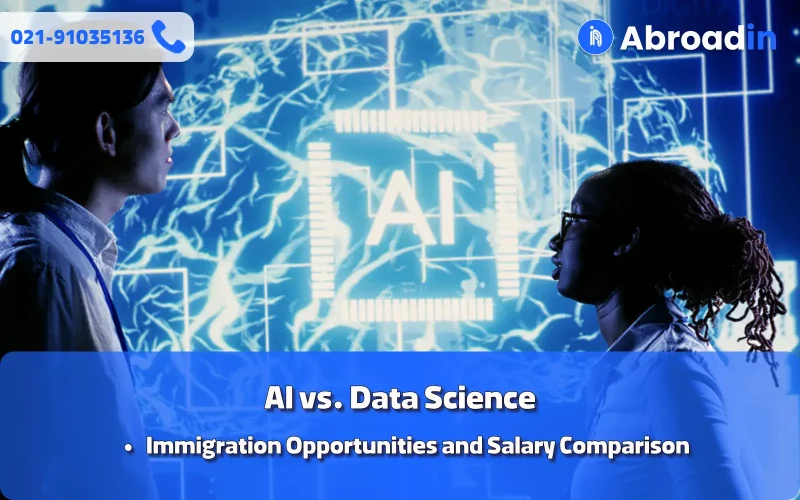

1. United States | Data Science or AI
In the United States, careers in data science and AI offer some of the highest salaries in the tech industry. AI vs. Data Science salaries as of 2025:
- Data Scientists earn an average of about $156,790 annually.
- Entry-level professionals start at around $117,276.
- Senior-level or principal data scientists can make up to $243,885.
Some top tech companies—like Google, Amazon, and Meta—often offer even higher compensation, with experienced professionals sometimes earning more than $250,000 annually.
AI professionals tend to have slightly higher earning potential:
- Machine Learning Engineers make an average of $162,509 per year.
- General AI Engineers earn between $79,000 and $190,000 depending on experience.
- Senior Machine Learning Engineers can expect salaries in the $170,000 to $200,000 range at major tech firms.
Interestingly, the average salary for Data Scientists listed on platforms like Glassdoor is closer to $125,126, showing how compensation can vary widely by company, role, and location.
The US remains one of the most attractive destinations for data and AI professionals due to its strong demand in cities like San Francisco, New York, and Seattle.
The Bureau of Labor Statistics predicts a 26% increase in positions for computer and information research scientists (which includes many AI roles) between 2023 and 2033, compared to the overall national job growth rate of just 4%.
The visa process can be a significant hurdle for international professionals. The H-1B visa is the most common option, and many companies use it to hire skilled foreign workers.
However, it’s competitive and capped at 85,000 new visas annually (including 20,000 for those with a US master’s degree or higher).
Leading tech companies like Google, Microsoft, and Amazon regularly sponsor H-1B visas for AI and Data Science roles.
2. Canada | AI vs. Data Science
Salaries in Canada are lower than in the United States, however the country makes up for it with strong demand and more accessible immigration pathways.
- Data Scientists in Canada typically earn between $51,000 and CAD 101,000 per year (roughly $36,500 to USD 72,000).
- AI professionals, such as Machine Learning Engineers, gain a bit more on average, with annual salaries of around CAD 116,235 (USD 83,000).
Although these numbers don’t match US levels, the growing number of research institutions and tech companies helps make up for the difference in pay.
Cities like Toronto, Montreal, and Vancouver are key tech hubs home to startups, research labs, and global firms investing in AI.
Institutions like the Vector Institute in Toronto have positioned Canada as a leader in AI research, which has drawn in talent and funding worldwide.
One of the reasons many professionals choose Canada is its immigration system. It offers several streamlined options for skilled workers:
- Global Talent Stream (GTS): A fast-track program that processes work permits in as little as 2–4 weeks. It’s tailored for high-demand roles in tech, including Data Scientists and Machine Learning Engineers.
- Post-Graduation Work Permit (PGWP): International graduates from Canadian institutions can work in Canada for up to 3 years after finishing their studies, gaining experience that can lead to permanent residency.
- Express Entry and Provincial Nominee Programs (PNP): These systems use a points-based method to prioritize candidates with STEM skills and Canadian work experience, making immigration more accessible.
Canada’s immigration policies are generally more welcoming than the US, especially for tech talent. AI professionals may have a slight edge, as the government actively supports roles in emerging technologies through initiatives like the GTS.
3. Germany | Data Science or AI
In Germany, salaries for data scientists and AI professionals are moderate compared to those in countries like the US, but they’re still competitive within Europe.
Look at AI vs. Data Science salaries:
- Data Scientists earn between $45,500 and $84,000, with the best-paying jobs in major cities like Berlin and Munich.
- AI and Machine Learning Engineers generally make a bit more, earning between $52,000 and $96,000 annually.
The demand for skilled workers in these fields is growing fast. Germany is focusing heavily on AI and Data Science, with strong government support and investment.
Cities like Berlin and Munich have become key centers for tech, and industries such as automotive, healthcare, and fintech are pushing the need for data and AI expertise even higher.
For people coming from outside the EU, Germany has several visa options that make it easier to move and work there:
- EU Blue Card: This is a popular choice for skilled non-EU workers. To qualify, you need a job offer with a salary above a specific limit (around €58,400 in 2023, or less for STEM jobs).
- Job Seeker Visa: This visa lets graduates stay in Germany for six months to look for work, which is helpful if you finish school there and need time to find a job.
- Graduate Work Permits: If you study in Germany, you can extend your stay by up to 18 months after graduation to search for a job and apply for permanent positions.
Overall, Germany offers a clear path for skilled tech professionals. Since the country is prioritizing AI development, jobs in AI might offer slightly better chances and more long-term opportunities.
4. United Kingdom | AI vs. Data Science
The UK has a mature tech landscape and globally recognized universities. This country offers good job prospects, especially in cities like London, Cambridge, and Edinburgh.
London, in particular, stands out for its concentration of AI startups, financial institutions, and healthcare companies investing heavily in data-driven solutions.
Salaries in the field are competitive by UK standards:
- Data Scientists can expect to earn between £45,000 and £84,000 annually.
- Machine Learning Engineers generally earn a bit more, typically between £56,000 and £68,000.
The demand for skilled professionals in data and AI is high and continues to grow as businesses adopt automation, data analytics, and intelligent systems.
Some of the main sectors driving this demand include:
- Finance, where data is used for fraud detection, risk modeling, and algorithmic trading
- Healthcare, with applications in diagnostics, medical imaging, and personalized treatment
- Startups, especially those working on products involving natural language processing, computer vision, or predictive analytics
The Graduate Visa allows international students who have completed a degree in the UK to stay and work for up to two years (three for PhD graduates).
This gives time to gain experience and find sponsorship. The Skilled Worker Visa is another key route, requiring a job offer from a licensed employer. Many tech companies across the country, not just big corporations, are eligible to sponsor.
Because AI-related roles often require specific expertise, employers may be more willing to support visa applications in this space.
5. Australia | Data Science or AI
If you’re looking at life in the southern hemisphere, Australia might be worth serious consideration. The country’s tech industry isn’t the largest, but it’s expanding steadily, especially in cities like Sydney and Melbourne.
These urban centers are seeing rising interest in AI-driven innovation across sectors like finance, healthcare, and mining—an industry you might not expect to rely on algorithms but increasingly does.
AI vs. Data Science salaries reflect the growing importance of these roles:
- Data Scientists in Australia typically earn between $80,000 and AUD 120,000, which translates to around $53,000 to USD 80,000.
- Those working in Machine Learning often earn a bit more—somewhere in the $90,000 to AUD 130,000 range ($60,000 to USD 86,000).
Compensation tends to be higher in major cities, and some companies offer relocation packages or visa assistance to attract international talent.
Australia also has a reputation for being relatively welcoming to skilled migrants, especially in tech. The immigration options are varied and structured to support both recent graduates and experienced professionals:
- One popular route is the Temporary Skill Shortage (TSS) Visa (Subclass 482), which allows companies to sponsor skilled workers for up to four years. AI and Data Science professionals are currently listed as eligible occupations.
- There’s also the Skilled Independent Visa (Subclass 189). This points-based system provides permanent residency without employer sponsorship, ideal for those with strong qualifications and work experience.
- For graduates, the Post-Study Work Stream makes things easier. Depending on your degree, you can stay and work in Australia for 2 to 4 years after finishing university.
Australia’s system rewards talent and education, especially in tech-related fields. If you need some professional consultation for studying abroad check this Abroadin service out.

6. Singapore | AI vs. Data Science
Singapore has many opportunities and efficiency for data science and AI professionals. While it may be small, it’s a central financial and technology hub in Asia, with substantial government support for digital transformation.
Projects like AI Singapore and Smart Nation aim to weave AI into public services, healthcare, and urban planning—creating consistent demand for talent in this space.
Salaries are competitive for the region:
- Data Scientists typically earn between $50,000 and SGD 90,000 (about $37,000 to USD 67,000).
- Machine Learning Engineers usually earn a bit more—ranging from $60,000 to SGD 100,000 ($44,000 to USD 74,000).
Roles in top companies like Grab, Shopee, or SEA Group often land at the upper end of the scale, especially if experience in deep learning or large-scale systems is involved.
Unlike some countries with dedicated post-study work visas, Singapore handles immigration differently. You’ll need a job offer to stay and work after graduation, but the system is relatively streamlined if you’re qualified.
Here’s how the visa landscape looks:
- Employment Pass (EP): The main route for professionals. To qualify, you need a job offer with a salary of at least S$5,000/month (as of 2025). Most Data Science and AI roles meet this threshold, and many local tech companies regularly sponsor EPs.
- S Pass: Aimed at mid-skilled workers. This is less common in AI and Data Science but can be used for junior roles, especially in support functions.
- No Post-Study Visa: Unlike Australia or the UK, Singapore doesn’t offer a visa extension for graduates. However, if you secure a job quickly, you can transition to an EP or S Pass.
For professionals with the right background, the pathway to working and staying in Singapore is clear—especially if you’re ready to move quickly after graduation.
7. Switzerland | Data Science or AI
Switzerland is one of Europe’s most attractive destinations for tech professionals—not just for the scenic views and high standard of living but also for the substantial salaries and solid job opportunities in fields like Data Science and AI.
Data Scientists earn well above the global average in cities such as Geneva and Zurich. A typical salary for a Data Scientist in Geneva is around USD 131,800 annually.
Machine Learning Engineers often earn just as much, if not slightly more, especially in sectors like robotics, finance, and emerging AI applications, where their expertise is in high demand.
Though the job market for AI vs. Data Science in Switzerland isn’t as large as in the US or UK, the opportunities are high-quality. Local industries—especially in fintech, pharmaceuticals, and engineering—are investing in automation and intelligent systems.
For non-EU professionals, Switzerland offers relatively straightforward work permit options if you have an offer from a Swiss employer.
Permits are usually granted to skilled workers when local candidates are unavailable, and tech roles tend to fall into this category.
Employers typically handle the visa process, and having a degree and work experience in AI or Data Science gives applicants a competitive edge.
Beyond the job itself, cities like Zurich and Geneva consistently rank among the highest in the world for quality of life, thanks to clean infrastructure, safety, public services, and natural beauty.
8. South Korea | AI vs. Data Science
Japan and China often dominate headlines, South Korea quietly offers strong opportunities for data professionals—especially in its capital, Seoul.
Known globally for its advanced infrastructure, innovation in electronics, and strong internet ecosystem, the country is now investing more in artificial intelligence and data science.
The salary range is solid for professionals with experience in these fields:
- Data Scientists typically earn between $50,000 and USD 90,000 annually.
- Machine Learning Engineers often earn a bit more, especially in sectors like robotics, manufacturing automation, and smart mobility.
South Korea’s strength in hardware and robotics makes it an exciting place for AI engineers looking to work close to real-world applications.
Here’s what you should know if you’re thinking of relocating:
- Skilled Worker Visas: South Korea has visa programs supporting foreign technical professionals. The E-7 visa, for example, allows employers to sponsor skilled foreign workers in sectors where local talent is limited.
- Tech Environment: Seoul is the central hub, home to top companies like Samsung, Naver, and Kakao, as well as a growing number of AI startups and R&D centers.
- Language: While English is used in international teams, Korean is still essential in daily life and can be an asset in many workplaces.
- Living in Asia: As a base, South Korea offers the chance to be part of the wider Asian tech network, with close ties to Japan, China, and Southeast Asia. It’s also known for its fast lifestyle, excellent transportation, and relatively low cost of living compared to other major tech hubs.
South Korea may not be the first country to come to mind for AI or data science jobs. However, it’s increasingly a wise choice for those looking to grow their careers while living in one of Asia’s most connected and forward-thinking societies.
Conclusion
AI offers slightly better immigration opportunities due to higher salaries and alignment with government-backed AI initiatives in Canada, Germany, and Singapore. However, Data Science remains highly viable, with strong demand and accessible visa pathways in countries like Australia and the UK.
This Abroadin article covered everything you need about AI vs. Data Science for international students. If you have any questions, leave a comment below so our experts can answer as soon as possible.
References
https://datalemur.com/blog/data-science-vs-machine-learning
https://medium.com/@richardhightower/data-scientists-job-trends-after-gen-ai-2e6b1685a8f9
FAQ
Here are the most frequently asked questions about the top study abroad consultants for Indian students:
AI roles like Machine Learning Engineers earn $162,509 annually, higher than Data Scientists’ $125,126. Top tech firms offer over $200,000 for experienced professionals.
Canada’s Global Talent Stream and Post-Graduation Work Permit (up to 3 years) support AI and Data Science graduates, with Express Entry aiding permanent residency.
AI professionals benefit from Germany’s EU Blue Card and 18-month job seeker visa, which align with national AI strategies and offer clear paths for skilled graduates.
Machine Learning Engineers earn £56,000–£68,000 in the UK, slightly higher than Data Scientists’ £45,000–£84,000. Demand is strong in London’s tech hub.
Australia’s Temporary Skill Shortage Visa and Post-Study Work Stream (2–4 years) support AI graduates, and the Skilled Independent Visa offers permanent residency.
For downloading PDF of the article fill the form


How useful was this post?
Click on a star to rate it!
Average rating 0 / 5. Vote count: 0
No votes so far! Be the first to rate this post.








No comment yet, add your voice below!